Byens haver, offentlige råvarestande letter madørkenens problemer

I denne fredag, 9. august, 2019, Foto, medarbejdere arbejder hos Growing Home, Incs gård i Chicagos kvarter Englewood. Atlanta, Chicago og andre store byer over hele landet tager en flerstrenget tilgang til at bringe sunde kostvaner til "madørkener, " for det meste kvarterer med lav indkomst, der ligger milevidt fra det nærmeste supermarked. Deres initiativer omfatter ferskvarestande på massetransitstationer, byhaver, og partnerskaber med rideshare-selskaber for at færge beboere til dagligvarebutikker og landmændsmarkeder. Målet er at reducere sundhedssygdomme og styrke lavindkomstsamfund. (AP Photo/Amr Alfiky)
På vej hjem, Darnell Eleby holdt en pause, før han gik ombord på pendlertoget i Atlantas Five Points-station og manøvrerede sin kørestol til et stop, der ikke var set på mange transportplatforme:en frisk madbod fyldt med farverige frugter og grøntsager. Hjælpet af en frivillig, han fyldte en kurv med bananer, æbler, majs og squash og betales med et sundhedsprogramkupon.
"Det hjælper dig, når du ikke kan komme til butikken, " sagde Eleby.
I Chicago, nonprofit-grupper har åbnet sundhedsklinikker, hvor personalet giver patienterne ernæringsundervisning og gratis kuponer til områdets landmændsmarkeder fyldt med sunde fødevarer. Begge byer har også tilskyndet til en spirende indsats for at anlægge byhaver.
Store byer over hele landet bruger denne flerstrengede tilgang til at bringe sunde kostvaner til "madørkener, " for det meste lavindkomstkvarterer beliggende milevidt fra det nærmeste supermarked. De håber ikke kun at reducere antallet af diabetes, højt blodtryk og fedme, men for at opmuntre samfundsaktivisme og empowerment.
"Vi gør dette ud fra ... ansvar over for vores samfund, "Safia Rashid sagde om haven, hun og hendes mand, Kamau Rashid, har passet på Chicagos South Side i de sidste 14 år.
Den 44-årige mor sagde, at parret begyndte havearbejde, da deres ældste søn var 3 år gammel, at bekæmpe "fødevareapartheid" ... folk, der bevidst disinvesterer i dette samfund, fjerner sund mad fra os, " sagde Safia Rashid.
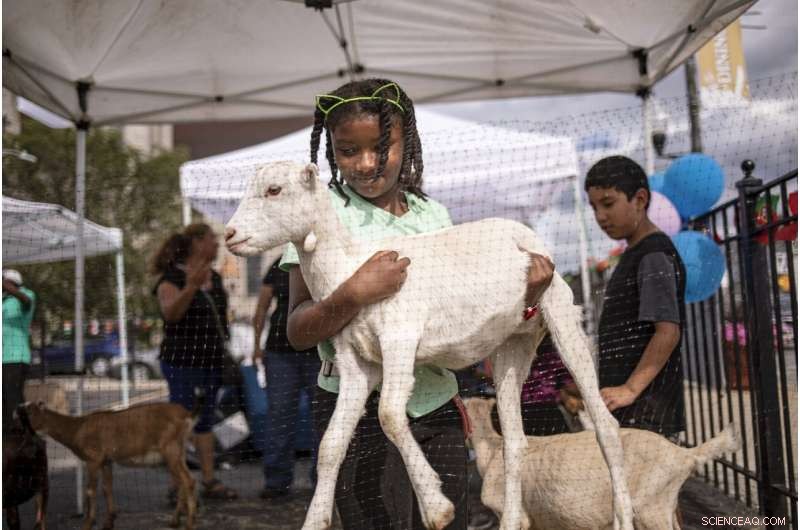
I denne fredag, 16. august, 2019, Foto, en pige bærer en ged på Inner-city Muslim Action Networks (IMAN) farmers market i Chicago i Chicago i Chicago. Atlanta, Chicago og andre store byer over hele landet tager en flerstrenget tilgang til at bringe sunde kostvaner til "madørkener, " for det meste kvarterer med lav indkomst, der ligger milevidt fra det nærmeste supermarked. Deres initiativer omfatter ferskvarestande på massetransitstationer, byhaver, og partnerskaber med rideshare-selskaber for at færge beboere til dagligvarebutikker og landmændsmarkeder. Målet er at reducere sundhedssygdomme og styrke lavindkomstsamfund. (AP Photo/Amr Alfiky)
Rashids' have vokser på South Chicago Farm, et 14 hektar stort (5,6 hektar) område udviklet i 2015. Det er en af otte sådanne gårde i Chicago, der drives af nonprofitorganisationen Urban Growers Collective.
I Atlanta, mange af tomaterne, ferskner og peberfrugter fundet i skraldespande på Fresh MARTA Markets kommer fra mad dyrket i byen og nærliggende gårde, sagde Hilary King, af nonprofit Community Farmers Markets, som samarbejder med Metropolitan Atlanta Rapid Transit Authority til at drive standene. Lanceret i 2015, MARTA-markederne er placeret på forskellige stationer i løbet af ugen.
"Vi kan ikke stole på traditionelle detailhandelsmetoder, " sagde Atlanta bylandbrugsdirektør Mario Cambardella.
Nonprofitorganisationer er også gået sammen med ridesharing-selskabet Lyft for at give op til 300 lavindkomstfamilier rabat på forlystelser til landmændsmarkeder og købmandsforretninger i Atlanta. Det seks måneder lange pilotprogram, kaldet Access AgLanta, begyndte 1. juni inspireret af et lignende Lyft-partnerskab i Washington, D.C.
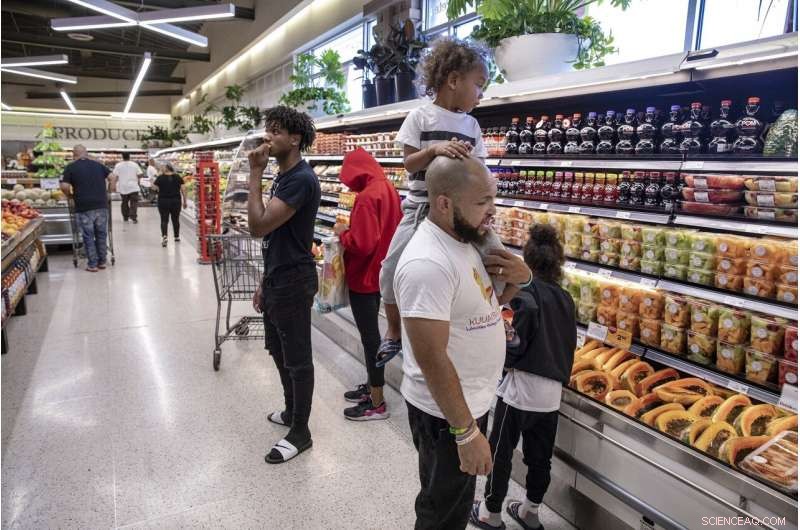
I denne torsdag, 15. august, 2019, Foto, Christopher "Mad Dog" Thomas, bærer sin søn, Rian Gatewood-Hillestad, mens du shopper på Pete's Market i Chicagos Garfield Neighborhood. Thomas, som voksede op i Altgeld Gardens-kvarteret på Chicagos South Side, sagde, at han har lidt af "madørkenens spiseforstyrrelse, ' hvor alt du har råd til at spise er slik." Thomas og hans kone, tage en ugentlig tur uden for deres nabolag til denne butik, som hans kone beskriver som "den sorte eller latinamerikanske Whole Foods." (AP Photo/Amr Alfiky)
"Det, vi ofte har hørt gennem årene, er, at transport er en enorm barriere for adgang til fødevarer, " said Alysa Moore, program manager for Georgia Fresh For Less, which provides state residents who receive food stamps with financial assistance to shop at farmers markets.
Eleby relies heavily on the transit platform markets. Without them, han sagde, he'd be forced to rely on a small scattering of stores in his low-income neighborhood in southwest Atlanta where he said he has to smell food or examine it for mold before buying it. The food there, han sagde, isn't "like it's supposed to be."
As of 2015, roughly 22% of Atlanta's population was living in a low-income community more than a mile from a food store, according to the U.S. Department of Agriculture.
In Chicago, that number is 5%. Comparatively, the number in Seattle is 7.8%; Washington, D.C., 6.4%; Baltimore, 4.3%; and Milwaukee, 3.5%, according to the USDA.
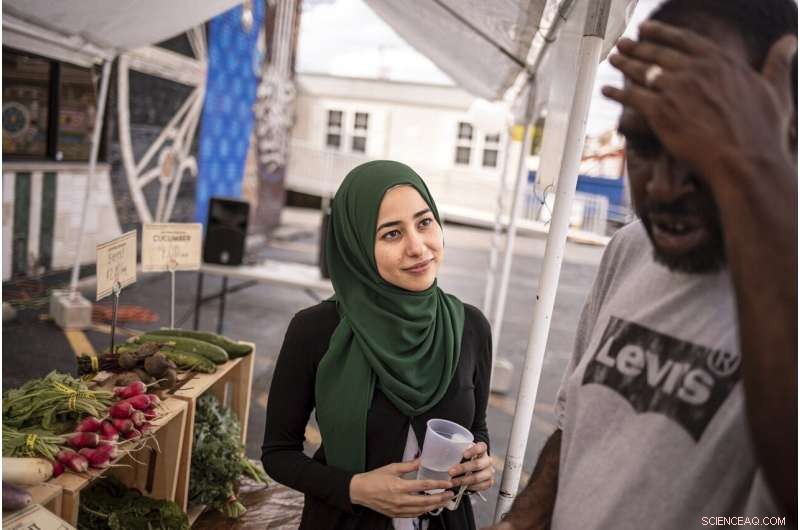
I denne mandag, Aug. 19, 2019, Foto, dietitian Heba Abdel Latief, ret, talks to her patient, Richard Ware, at Inner-city Muslim Action Network's (IMAN) farmers market in Chicago. IMAN offers free of charge dietitian visits at their health clinic. Atlanta, Chicago and other large cities across the country are taking a multi-pronged approach to bringing healthy diets to "food deserts, " mostly low-income neighborhoods located miles away from the nearest supermarket. The goal is to reduce health disorders and empower low-income communities. (AP Photo/Amr Alfiky)
Christopher "Mad Dog" Thomas, 34, who grew up in the Altgeld Gardens neighborhood on Chicago's South Side, said he has suffered from "'food desert eating disorder, ' where all you can afford to eat is candy."
Thomas and his wife, Kathryn Gatewood, make a weekly trip outside their neighborhood to a store called Pete's Supermarket, which Kathryn Gatewood describes as "the black or Hispanic Whole Foods."
"We spend almost 40% of our paychecks combined to ensure a healthier diet for our kids, " hun sagde, adding that it is a better alternative than buying bad food from the "dusty shelves" of corner stores in Englewood.
The Chicago nonprofit Inner-City Muslim Action Network has launched "The Corner Store Campaign" to change that.
Sami Defalla, who runs the Morgan Mini Mart in Englewood, has been an active partner with the campaign for more than two years. Defalla has created a "green zone" in the store where shoppers can purchase inexpensive fresh fruits and vegetables.
-
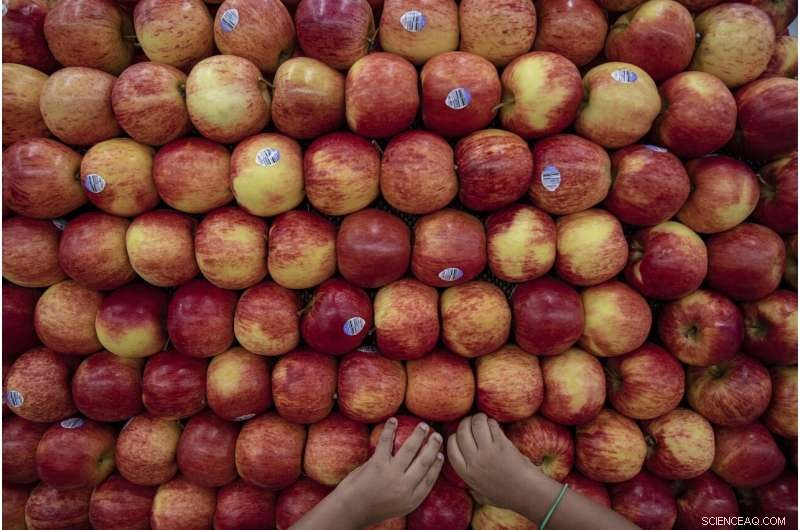
I denne torsdag, Aug. 15, 2019, Foto, Rian Gatewood-Hillestad plays with apples while shopping with his parents at Pete's Market in Chicago's Garfield Neighborhood. Christopher "Mad Dog" Thomas, Rian's father, organizes a weekly family trip outside their neighborhood to Pete's Supermarket, which his wife describes as "the black or Hispanic Whole Foods." (AP Photo/Amr Alfiky)
-
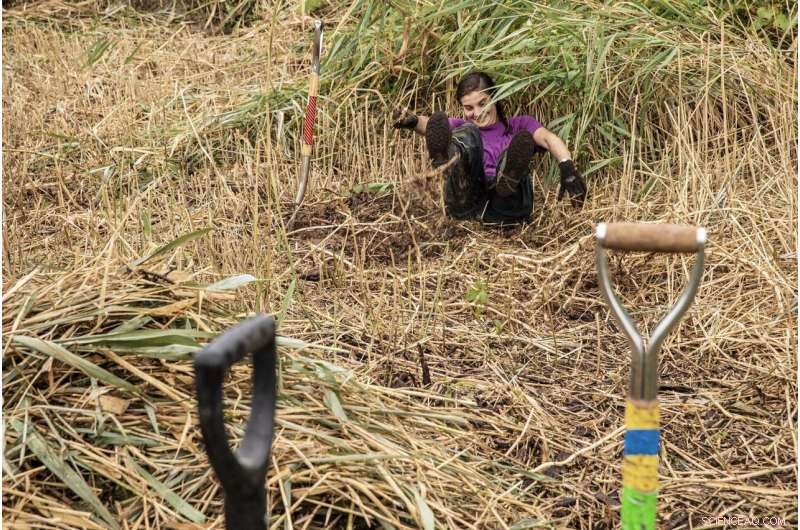
I denne lørdag, Aug. 17, 2019, Foto, Viviana Gentry Fernandez-Pellon, co-founder of Cooperation Operation, smiles as she falls on her back while working to clear section of high weeds and brush to create a new space for an organic produce garden in the Pullman neighborhood of Chicago. Large cities across the country are using a multi-pronged approach to bring healthy diets to "food deserts, " mostly low-income neighborhoods located miles away from the nearest supermarket. They hope not only to reduce rates of diabetes, high blood pressure and obesity, but to encourage community activism and empowerment. (AP Photo/Amr Alfiky)
-
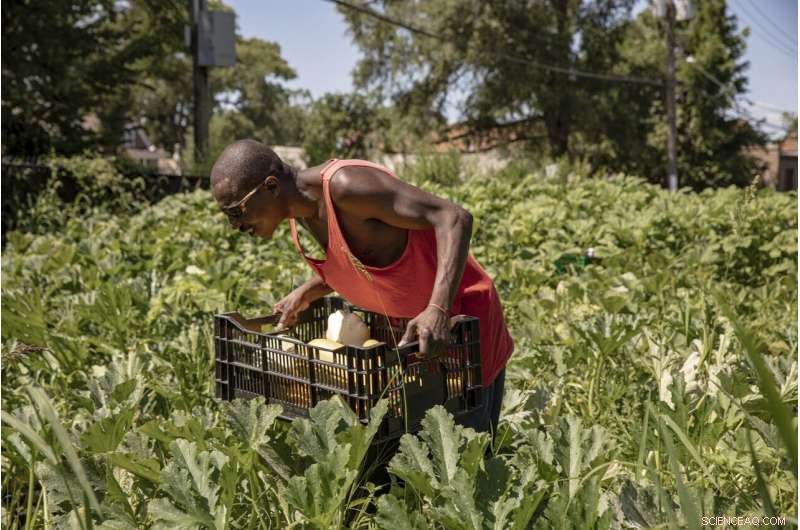
I denne fredag, Aug. 9, 2019, Foto, Stanford Williams works at the Growing Home, Inc. farm in Chicago's Englewood neighborhood. Large cities across the country are using a multi-pronged approach to bring healthy diets to "food deserts, " mostly low-income neighborhoods located miles away from the nearest supermarket. They hope not only to reduce rates of diabetes, high blood pressure and obesity, but to encourage community activism and empowerment. (AP Photo/Amr Alfiky)
-
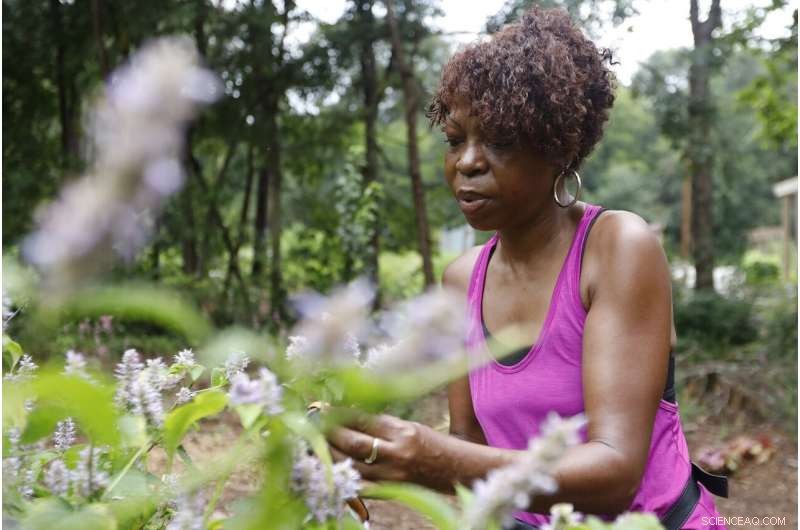
I denne fredag, July 19, 2019 foto, Celeste Lomax harvests anise hyssop plants in a community garden at the Urban Food Forest at Browns Mill in Atlanta. Lomax lives in a low-income neighborhood in south Atlanta with limited access to healthy food. She said the community gardens provide an alternative food source for volunteers and neighborhood residents. (AP Photo/Andrea Smith)
-
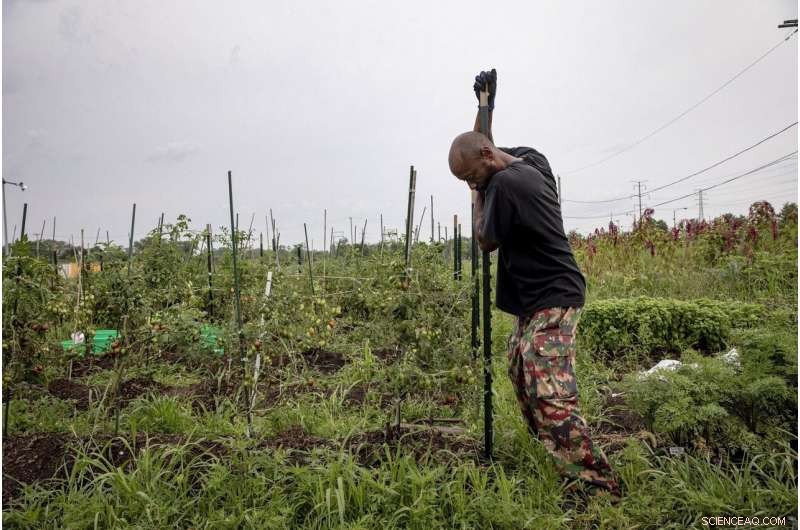
In this Tuesday, Aug. 20, 2019, Foto, Kamau Rashid works in his garden in the South Chicago Farm on Chicago's south side. Rashid and his wife Safia, started urban farming almost 14 years ago, when their oldest son was 3 years old. "We're doing this out of us feeling the need and responsibility toward our community." Safia Rashid, sagde. Living in a neighborhood with little access to healthy foods, so-called food deserts, they set out to fight what they called "food apartheid." (AP Photo/Amr Alfiky)
-
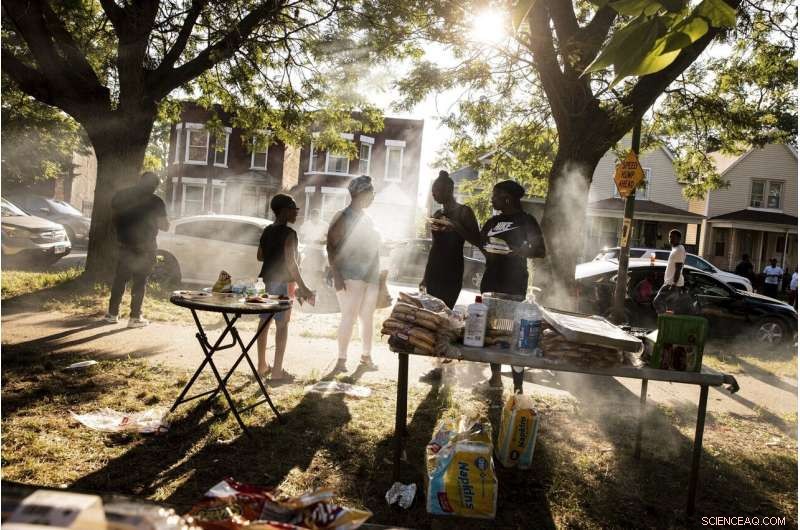
I denne torsdag, 1. august 2019, Foto, people gather for a barbecue in a vacant lot hosted by Inner-city Muslim Action Network's (IMAN) in Chicago's neighborhood of West Englewood. IMAN seeks to educated people on proper nutrition in a section of the city with low access to nutritional foods. (AP Photo/Amr Alfiky)
-
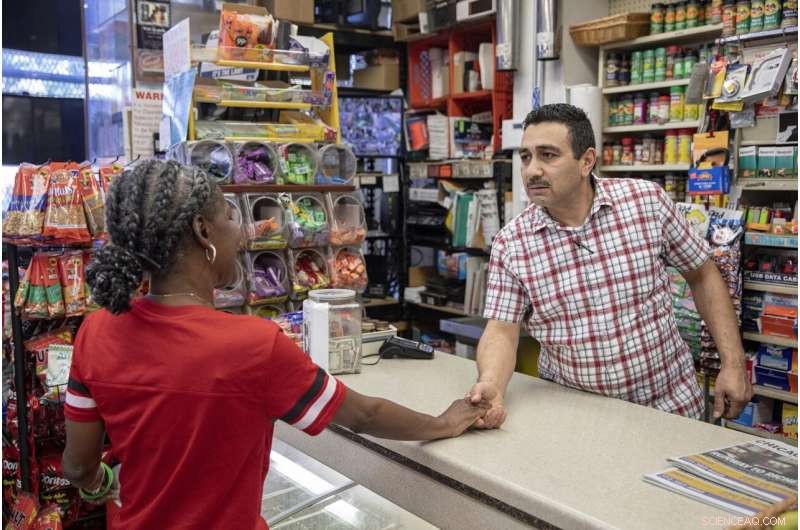
I denne mandag, Aug. 19, 2019, Foto, Sami Deffala, owner of the Morgan Mini Mart in Chicago's Englewood neighborhood, ret, offers his condolences to a customer who lost her 17-year-old son recently to gun violence in Ohio. Sami Defalla, who runs the small Mart in Englewood, has been an active partner with the campaign for more than two years. Defalla has created a "green zone" in the store where shoppers can purchase inexpensive fresh fruits and vegetables. (AP Photo/Amr Alfiky)
-
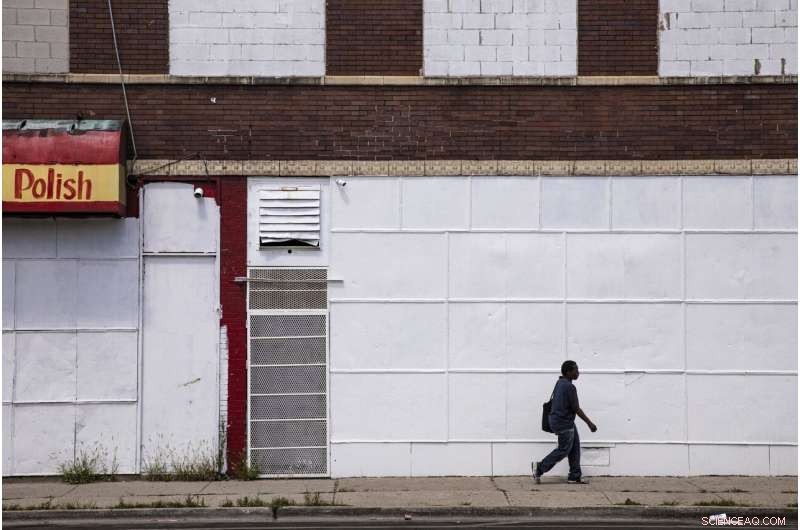
I denne fredag, Aug. 9, 2019, Foto, a man walks on a sidewalk past boarded up business in Chicago's Englewood neighborhood. As of 2015, roughly 22% of Atlanta's population was living in a low-income community more than a mile from a food store, and in Chicago, that number is 5%, according to the U.S. Department of Agriculture. (AP Photo/Amr Alfiky)
-
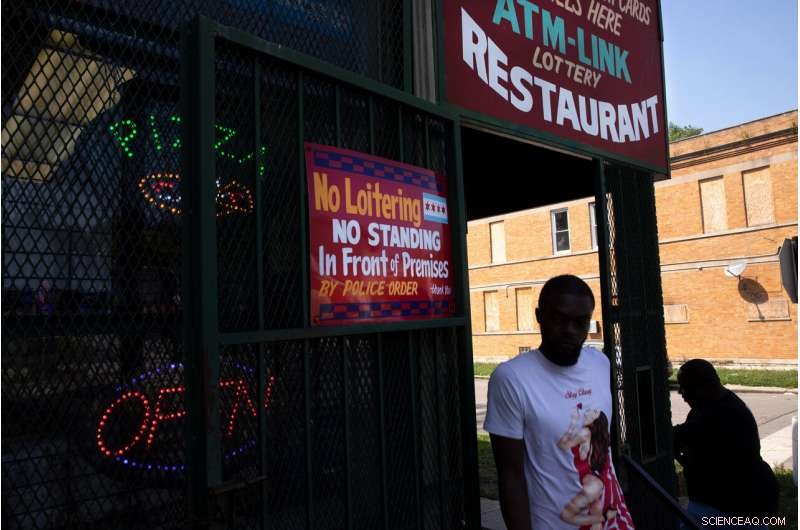
I denne mandag, Aug. 19, 2019, Foto, two people pass though the doorway of the Morgan Mini Mart in Chicago's Englewood neighborhood. Sami Defalla, who runs the Morgan Mini Mart in Englewood, has been an active partner with the campaign for more than two years. Defalla has created a "green zone" in the store where shoppers can purchase inexpensive fresh fruits and vegetables. (AP Photo/Amr Alfiky)
-
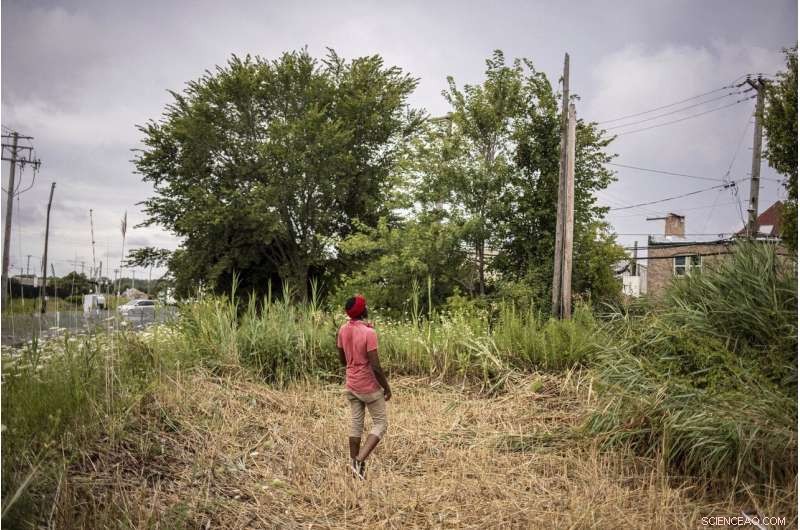
I denne lørdag, Aug. 17, 2019, Foto, Olisaemeka Okakpu walks into a section of public land consisting of high weeds and brush, that his organization Cooperation Operation plan to clear for an organic produce garden in the Pullman neighborhood of Chicago. (AP Photo/Amr Alfiky)
-
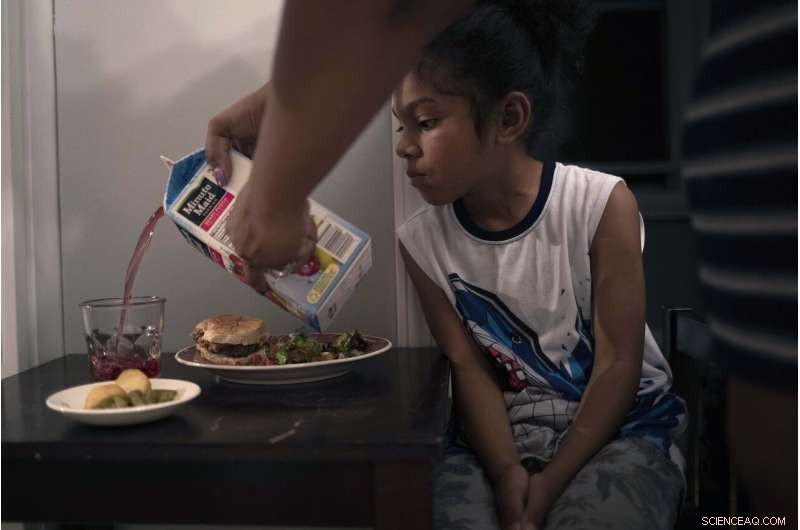
I denne torsdag, Aug. 15, 2019, Foto, Kathryn Gatewood pours juice into a glass for her son, Tracy at their home in Chicago's Englewood Neighborhood. "We spend almost 40% of our paychecks combined to ensure a healthier diet for our kids, " hun sagde, adding that it is a better alternative than buying bad food from the "dusty shelves" of corner stores in Englewood. (AP Photo/Amr Alfiky)
-
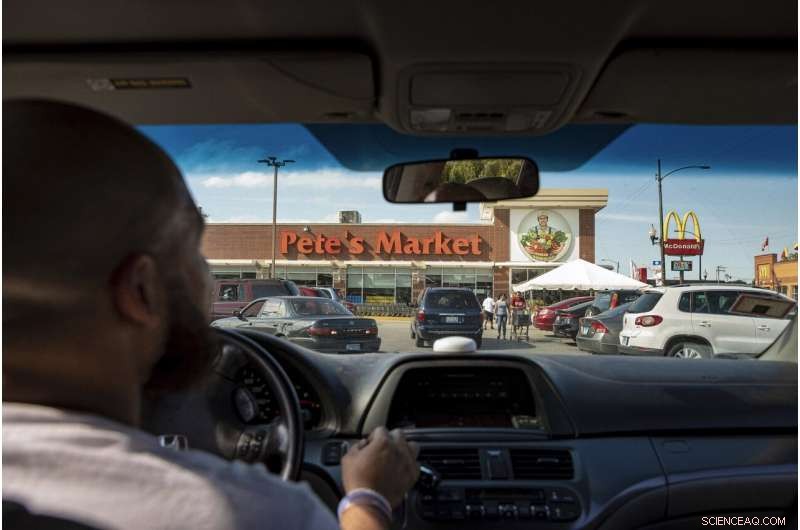
I denne torsdag, Aug.15, 2019, Foto, Christopher "Mad Dog" Thomas, drives into Pete's Market in Chicago's Garfield Neighborhood. Thomas organizes a weekly family trip outside their neighborhood to the store, which his wife describes as "the black or Hispanic Whole Foods." (AP Photo/Amr Alfiky)
-
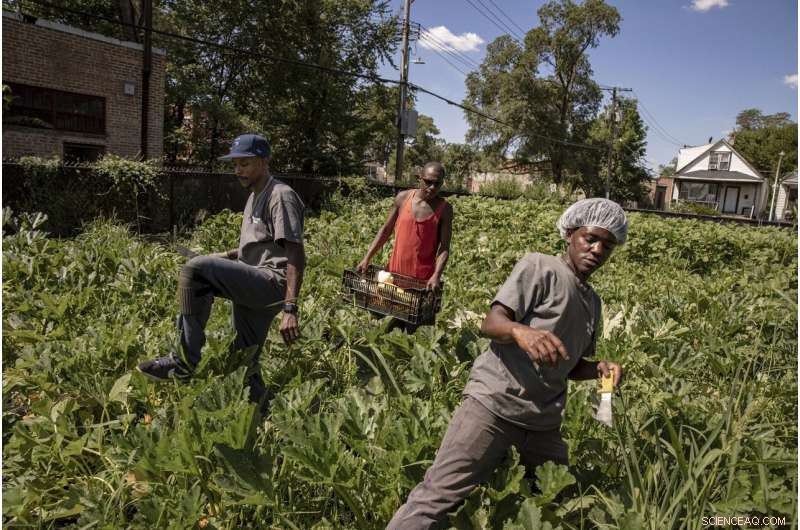
I denne fredag, Aug. 9, 2019, Foto, Maurice McCary, venstre, Stanford Williams, center and Torreyon Simmons, work at the Growing Home, Inc. farm in Chicago's Englewood neighborhood. Large cities across the country are using a multi-pronged approach to bring healthy diets to "food deserts, " mostly low-income neighborhoods located miles away from the nearest supermarket. They hope not only to reduce rates of diabetes, high blood pressure and obesity, but to encourage community activism and empowerment. (AP Photo/Amr Alfiky)
-
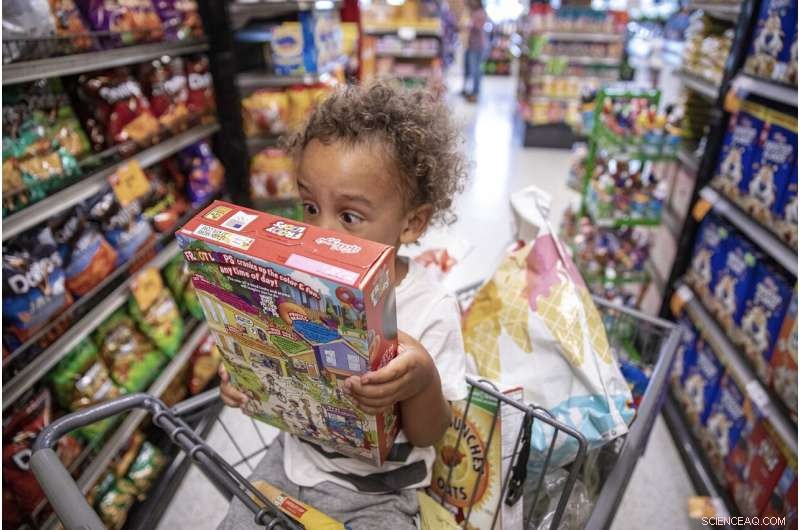
I denne torsdag, Aug. 15, 2019, Foto, Rian Gatewood-Hillestad reacts to cartoons printed on a cereal box while shopping with his parents at Pete's Market in Chicago's Garfield neighborhood. Christopher "Mad Dog" Thomas, Rian's father, organizes a weekly family trip outside their neighborhood to Pete's Supermarket, which his wife describes as "the black or Hispanic Whole Foods." (AP Photo/Amr Alfiky)
-
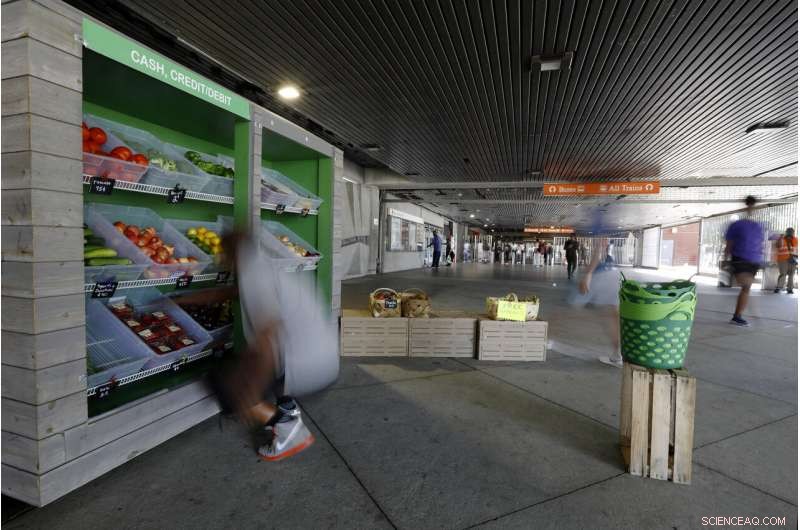
In this Tuesday, Aug. 20, 2019 foto, people pass by the Fresh MARTA Market in the West End transit station in Atlanta. The Metropolitan Atlanta Rapid Transit Authority and the Atlanta nonprofit Community Farmers Markets partner to run the stands, which sell food from some Atlanta urban farms. (AP Photo/Andrea Smith)
-
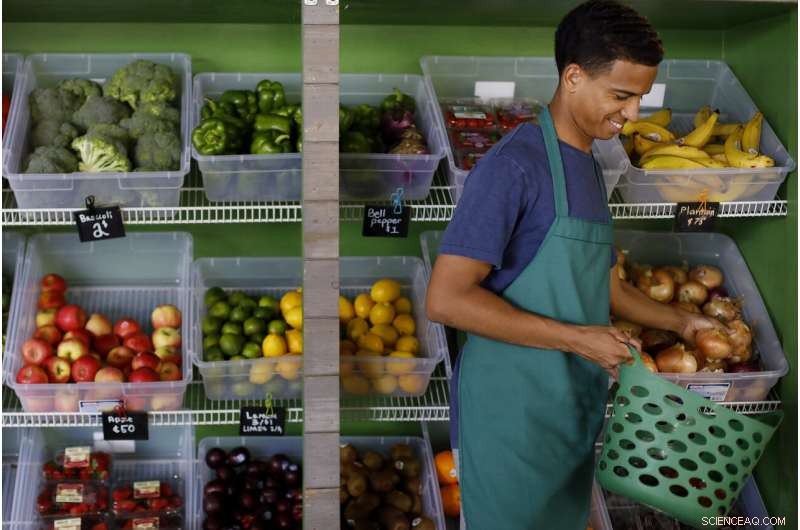
In this Tuesday, Aug. 20, 2019 foto, volunteer Xavier Lopez helps a customer select fruits and vegetables at the Fresh MARTA Market at the West End transit station in Atlanta. The Metropolitan Atlanta Rapid Transit Authority and the Atlanta nonprofit Community Farmers Markets partner to run the stands, which provide a healthy food source for people living in food deserts.(AP Photo/Andrea Smith)
-
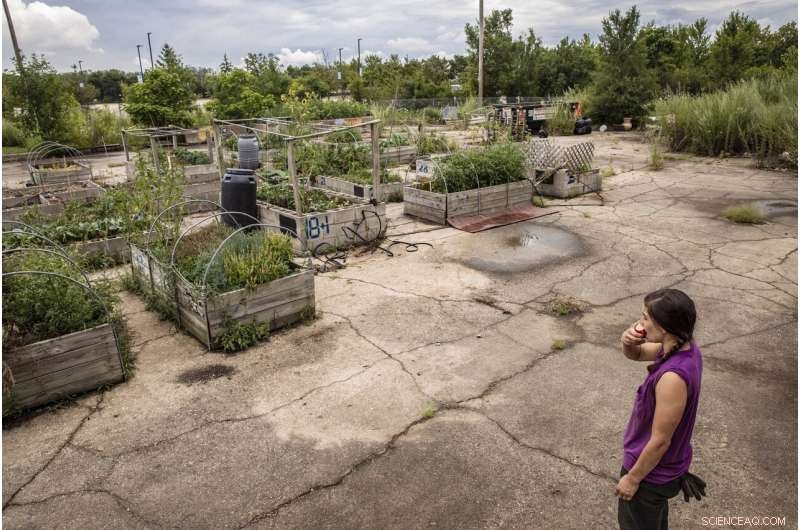
I denne lørdag, Aug. 17, 2019, Foto, Viviana Gentry Fernandez-Pellon, co-founder of Cooperation Operation, eats an apple as she looks over the successful urban community garden in Chicago's Pullman neighborhood. (AP Photo/Amr Alfiky)
"I wish I had a bigger platform to offer more ... to my customers, " Deffala said.
The Muslim Action Network also operates a health clinic where patients can see a dietitian free of charge and receive coupons for free produce at the nearby farmers market. Every Friday, the group hosts a farmers market where residents can connect with local urban farmers.
As a volunteer in a community garden in Atlanta, Celeste Lomax is finally able to take fresh produce home to her low-income neighborhood, which is located about 4 miles (6.4 kilometers) away from the nearest supermarket.
"We have a right to eat healthy like everyone else does, " hun sagde.
© 2019 The Associated Press. Alle rettigheder forbeholdes.
 Varme artikler
Varme artikler
-
 Liste over typer af dyreopførselStudiet af dyrs adfærd, kaldet etologi, er et bredt felt, der omfatter både instinktuel og indlært adfærd såvel som unormal adfærd. Inden for en bestemt dyreart kan visse opførsler være til stede i
Liste over typer af dyreopførselStudiet af dyrs adfærd, kaldet etologi, er et bredt felt, der omfatter både instinktuel og indlært adfærd såvel som unormal adfærd. Inden for en bestemt dyreart kan visse opførsler være til stede i -
 Undersøgelse åbner nye spørgsmål om, hvordan atmosfæren og oceanerne dannede sigDr. Mark Kendrick er vist med en prøve af vulkansk glas. Kredit:Stuart Hay, ANU En ny undersøgelse ledet af The Australian National University (ANU) har fundet havvandscyklusser i hele Jordens ind
Undersøgelse åbner nye spørgsmål om, hvordan atmosfæren og oceanerne dannede sigDr. Mark Kendrick er vist med en prøve af vulkansk glas. Kredit:Stuart Hay, ANU En ny undersøgelse ledet af The Australian National University (ANU) har fundet havvandscyklusser i hele Jordens ind -
 Australien ønsker at bygge en enorm betonbane i Antarktis. Her er hvorfor det er en dårlig idéVestfold -bakkerne, det foreslåede sted for flyvepladsen. Kredit:Nick Roden Australien vil bygge en 2,7 kilometer lang betonlandingsbane i Antarktis, verdens største naturreservat. Planen, hvis go
Australien ønsker at bygge en enorm betonbane i Antarktis. Her er hvorfor det er en dårlig idéVestfold -bakkerne, det foreslåede sted for flyvepladsen. Kredit:Nick Roden Australien vil bygge en 2,7 kilometer lang betonlandingsbane i Antarktis, verdens største naturreservat. Planen, hvis go -
 Video:Antarktis opdagelsesrejsende og polarbiolog diskuterer et af historiens største isbjergbrudKredit:University of Alabama i Birmingham University of Alabama i Birmingham polarbiolog og Antarktis opdagelsesrejsende, Jim McClintock, Ph.D., givet forhåndsindsigt i Larsen C ishyldebruddet, de
Video:Antarktis opdagelsesrejsende og polarbiolog diskuterer et af historiens største isbjergbrudKredit:University of Alabama i Birmingham University of Alabama i Birmingham polarbiolog og Antarktis opdagelsesrejsende, Jim McClintock, Ph.D., givet forhåndsindsigt i Larsen C ishyldebruddet, de
- Facebook mister mangeårig produktchef, da det fornyer strategien
- Hvorfor primordiale asteroider, der undgik massive kollisioner, alle ser ud til at have omtrent samm…
- SLACs nye røntgenlaserdatasystem vil behandle en million billeder i sekundet
- Hvorfor den globale undersøgelse om sikkerhed er dybt mangelfuld
- 302 Vs. 304 rustfrit stål
- Uventede facetter af Antarktis dukker op fra laboratorierne


